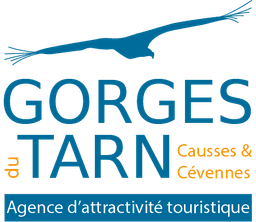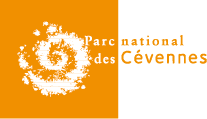
The Camisards (by mountain-bike)
11 points of interest

Pique prune (Osmoderme) - © Jean Pierre Malafosse  Fauna
FaunaHermit beetle (Osmoderma eremita)
This beetle is a declining, endangered and protected species. It is considered a reliable bio-indicator of environmental quality. An essential link in the proper functioning of forest environments, it likes mature deciduous forests and dead wood. The specific management of the strict nature reserve of Le Marquairès favours its development. Here, forestry is forbidden, and the forest is left to evolve naturally.

Maison forestière du Marquairès - nathalie.thomas  History
History1938: the forestry road
You are on the “road of the unemployed”. From 1936 to 1939, the crisis that shook the country led the government to put in place social programmes giving the jobless employment on major works: forest planning, thinning out tree stands, opening up new roads, etc. This road was created using shovels, picks and axes by 20 or so unemployed men and some locals. The “unemployment card” of the day gave the unemployed the right to a bonus when they worked on major works. A refectory was set up in the forester’s house at Le Marquairès, then at Les Cabanes (at the other end of the road); locals brought their own food.
Vue sur la vallée du Trépalou - © com com Florac Sud Lozère  Water
WaterThe Tarnon
The Tarnon is 38.9 km long and has its spring on the Aigoual massif (1,565 m) in the municipality of Bassurels. After its confluence with the Mimente, it flows into the Tarn downstream of Florac. It separates the Causse Méjean plateau from the Cévennes. Upstream of Rousses, the Trépalous flows into the Tarnon. This small river has carved out the Tapoul Gorge, which is famous for canyoning. The Tarnon is a Cévenol river: very abrupt and intense floods can occur during extreme weather events.

Transhumance - © Michelle Sabatier AgricultureThe Margeride draille (drovers’ road)
The draille follows the ridge and crosses the Can de l'Hospitalet plateau. This transhumant trail enables the sheep flocks of the plains (of the southern Cévennes and the Crau) to move up to northern Gévaudan (Aubrac, Margeride, Mont Lozère). This draille is only one branch of a larger network along which transhumant livestock still travel.

Météosite de l'Aigoual - © Olivier Prohin  Water
WaterMont Aigoual
A beautiful view onto Mont Aigoual (1,567 m) – a mountain of winds, fog, snow and rain. Banks of clouds coming from the Mediterranean rub against its slopes and can cause violent precipitation (also called Cévenol episodes). This temperamental mountain is home to the last mountain weather-station in France.

Frêne commun - Nathalie Thomas  Flora
FloraAsh trees
Ash trees, like the ones that border the path, like cool and damp environments. They were planted alongside paths by locals because ash branches, cut towards the end of summer, provided additional fodder for livestock.

Village de Vernagues - Nathalie Thomas  Geology
GeologySchist or dolomite
Schist areas form a rock base on which layers of sediment - limestone and dolomite - have collected. These are covered in chestnut trees and heaths of heather, broom and ferns unless they have been reforested. Underneath this vegetation, the transition between the two bedrocks is not always visible, but it is indicated by the human settlements at mid-slope. Rainwater that has filtered through the rocks emerges again where it hits the impermeable schist, creating springs.

L'eglise de Vébron - © CC Florac Sud Lozère  Architecture
ArchitectureVébron
A village of 200 inhabitants, Vébron extends from the Tarnon valley to the Causse Méjean. It has a school, temple (Protestant church) and shops. Every summer, it hosts the International Video Film Festival, whose patron until 2014 was French veteran actress] Bernadette Lafont. The square at the heart of the village is a lovely spot for a little rest.

Le Tarnon à Vébron - nathalie.thomas  History
HistoryFloods
Local floods can be catastrophic, like the one in 1900 described by Louis Tessier, a primary schoolteacher in Saint Roman, while on holiday in his native village: “Around noon, the atmosphere grew heavy with blackish clouds... At around 7 p.m., the storm headed north and soon the horizon all around was lit up by lightning... A deluge of rain hit the ground... At midnight, in profound darkness lit up by lightning, the alarm sounded... In the morning, the terrible news spread rapidly. The old mill at Vébron has been obliterated by the floodwaters, and all six members of the Goût family have been swept away... Astié Mill has been destroyed, and all the bridges have lost their parapets... All that beautiful riverfront is now ruin and desolation - it seems like a bad dream...”

Plaque commémorative, rochers de La Can de l'Hospitalet - © Henry SALESSE / MEDDE-MLETR  History
HistoryThe Camisards
The Tarnon valley was a significant area during the Camisard War. It sheltered the 3rd Camisard Army. Many clandestine gatherings were held here in the gloomy forests or in a cave underneath the Can de l'Hospitalet (known as Baume dolente).

Le long du Tarnon - Nathalie Thomas  Water
WaterThe Tarnon river
The Tarnon is 38.9 km long and has its spring on the Mont Aigoual massif (Mont Aigoual: 1,565 m) in the municipality of Bassurels. It flows into the Tarn upstream of Florac, having already joined with the Mimente river. It separates the Causse Méjean plateau from the Cévennes.
Upstream of Rousses, the Trépalous flows into the Tarnon. It is this small river that has carved out the Tapoul gorge, famous for canyoning.
The Tarnon may experience violent and sudden floods during Cévenol episodes (major rain storms). Its flow rate may vary from 0.1 m3 per second (in the dry period) to 400 m3/s (November 1982).
Description
Mountain-bike route #15. From the village, take the D 907 for 4 km towards the Tunnel du Marquaires. Before the tunnel, fork right towards the Le Marquaires forester's house and continue on the forestry track to Gaseiral. Take the road uphill to the Col de Salides and there take the ridge track on the left to L'Hospitalet (GR 7). Go down to Vébron (don't hill to the Moulin d'Astier), cross the Tarnon and join up again with the D 907 to Gua. Cross Gua and cycle along the river Tarnon to get to Prat Nouvel and then to Rousses.
- Departure : Rousses
- Arrival : Rousses
- Towns crossed : Rousses, Bassurels, and Vebron
Forecast
Altimetric profile
Recommandations
No cycling off-track. You are strongly advised to wear a helmet. Do not forget your repair kit and a small set of tools. Please shut all gates and barriers after yourself. Slow down in farms and hamlets.
Access and parking
From Florac or Meyrueis, take the D 996 to Vébron, and then the D 907 to Rousses.
Parking :
Calculateur d'itinéraire Lio
Utilisez le calculateur liO pour organiser votre trajet en région Occitanie.
Autres régions
Calculez votre itinéraire en Auvergne Rhône Alpes sur Oùra
Biodiversité autour de l'itinéraire
Source


Report a problem or an error
If you have found an error on this page or if you have noticed any problems during your hike, please report them to us here:
